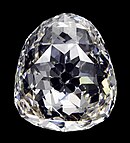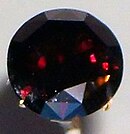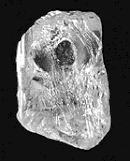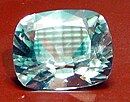| Name | Uncut weight (carat) | Cut weight (carat) | Color | Country/region of origin | Description | Image |
|---|---|---|---|---|---|---|
| Akbar Shah | 116, later 71.7 | colorless | An Indian diamond which became famous during the days of the Mughal Empire. A diamond with a roughly pear-shaped outline and random faceting, including two Persian inscriptions, the first reading "Shah Akbar, the Grand King, 1028 A.H." (the letters mean Anno Hegirae). The second inscription read "To the Lord of Two Worlds, 1039 A.H. Shah Jehan". The diamond was reportedly part of the original Peacock Throne. Purchased in 1886 in Istanbul by London merchant George Blogg, who re-cut it from 116 carats (23.2 g) to a pear-shape of 71.70 carats (14.340 g), thus destroying the historic inscriptions. Blogg was the last known owner and the stone's whereabouts are presently unknown. | |||
| Allnatt Diamond | 101.29 | yellow | A 101.29-carat (20.258 g) antique cushion-shaped brilliant fancy vivid yellow diamond which is believed to be found in the Premier mine in South African Republic. He got the name Allnatt[1] after one of its owners, Major Alfred Ernest Allnatt. The diamond was sold for a little more than $3 million at Christie’s auction in Geneva in May 1996. |  Allnatt Diamond | ||
| Amarillo Starlight | 16.37 | 7.54 | colorless | The largest diamond found by a park visitor in the Crater of Diamonds State Park in Arkansas since 1972, when it was established as a state park. It was found by W. W. Johnson of Amarillo, Texas in 1975 and was a 16.37 carats (3.27 g) white diamond, but it has since been cut into a 7.54 carats (1,510 mg) marquise shape. | ||
| Amsterdam Diamond | 33.74 | black | A 33.74 carat (6.748 g) pear-shaped black diamond which sold for $352,000 in 2001. | |||
| Archduke Joseph | 78.54 | 76.02 | colorless | Historical cushion-shaped, D colour, internally flawless Golcondadiamond, sold on 13 November 2012 by Christies to an anonymous buyer for US$21.4M.[2] | ||
| Argyle Pink Jubilee | 12.76 | 8.01 | pink | Argyle Pink Jubilee[3] is the largest pink diamond ever found in Australia weighing 12.76 carats. The diamond was found in Western Australia in Argyle Mine who is the largest producer of pink diamonds in the world. | ||
| Ashberg Diamond | 102.48 | amber | 102.48 carats (20.496 g) | |||
| Aurora Butterfly of Peace | A display of 240 fancy-colored diamonds. |  The 240 diamonds | ||||
| Aurora Pyramid of Hope | A display of 296 diamonds of natural colors. |  The 296 diamonds | ||||
| Beau Sancy | 34.98 | colorless | A 34.98-carat (6.996 g)[4] pear-shaped diamond, which sold for US $10 million in 2012.[5] Not to be confused with the Sancy. |  Beau Sancy | ||
| Black Orlov | 67.5 | black | a 67.50-carat (13.500 g) cushion-cut black diamond, also called theEye of Brahma Diamond. | |||
| Blue Heart Diamond | 103 | 30.82 | blue | 30.82-carat (6.164 g) heart brilliant. Part of the Smithsoniancollection. | ||
| Briolette of India | 90.38 | colorless | 90.38 carats (18.076 g) - Cut by Cartier around 1910. | |||
| Centenary Diamond | 599 | 273.85 | colorless | 273.85 carats (54.770 g), modified heart-shaped brilliant, the world's largest colorless (grade D), flawless diamond. | ||
| Chloe Diamond | 84.37 | colorless | Currently owned by Essex Global Trading, Inc. a New York-based Diamond and Jewelry company. Largest round brilliant-cut diamond ever put on auction. Sold on 14 November 2007 at Sotheby's inGeneva to Georges Marciano of the Guess clothing line for $16.2 million, the second-highest price ever paid for a diamond on auction. Took 2 years to cut. | |||
| Cora Sun-Drop Diamond | 110.03 | yellow | Largest known pear-shape fancy vivid yellow diamond, found in South-Africa[6][7] | |||
| Cross of Asia | 280 | 79.12 | yellow | Discovered in 1902 at the Jagersfontein Mine as a 280-carat (56 g) crystal. The first cut was to 142 carats (28.4 g); it was then cut three more times until, in 1993, it was a 79.12 carats (15.824 g) radiant-cut with table facets that resemble a Maltese cross.[8] | ||
| Cullinan Diamond | 3106.75 | various | colorless | the largest rough gem-quality diamond ever found at 3106.75 carats (621.35 g). It was cut into 105 diamonds including the Cullinan I or the Great Star of Africa, 530.2 carats (106.04 g), and the Cullinan II or the Lesser Star of Africa, 317.4 carats (63.48 g), both of which are now part of the British Crown Jewels. |  Nine of the diamonds | |
| Cullinan I | 3106.75 | 530.4 | colorless | The largest stone obtained from Cullinan diamond.[9] Cullinan I or Great Star of Africa with weight of 530.4 carats it is the second largest cut diamond in the world. Currently located in the head of the Sceptre of the British Crown Jewels British Royal family. | ||
| Cullinan II | 3106.75 | 317.4 | colorless | The second largest stone obtained from Cullinan diamond. Cullinan II[10] or Lesser Star of Africa with weight of 317.4 carats is also one of the largest cut diamonds in the world. As Cullinan I, it is also in the British crown jewels located in the Imperial State Crown British Royal family. | ||
| Daria-i-Noor | 182 | pink | The largest pink diamond in the world, approximately 182 carats (36.4 g), originally from India but now part of Iranian Crown Jewels. Its exact weight is not known; 182 carats (36.4 g) is an estimate. |  The Daria-i-Noor | ||
| Deepdene | 104.52 | yellow | Widely considered to be the largest artificially irradiated diamond in the world, at 104.52 carats (20.904 g). | |||
| DeYoung Red Diamond | 5.03 | brownish-red | Weighing 5.03 carats (1.006 g), the fourth-largest known red diamond GIA graded as the FANCY DARK REDDISH BROWN, was bought in a flea market on a hatpin by Sidney deYoung a prominent Boston estate jewelry merchant. It was donated by him to theSmithsonian Institution National Museum of Natural History. |  | ||
| Dresden Green Diamond | 41 | green | 41-carat (8.2 g) antique pear-shaped brilliant - its color is the result of natural irradiation |  Dresden Green (glass replica) | ||
| Dresden White Diamond | 47 | colorless | 47-carat (9.4 g) antique oval brilliant, near-colorless | |||
| Dresden Yellow Diamond | 38 | yellow | 38-carat (7.6 g) antique round cut | |||
| Edcora Red | 5.71 | red | A modified pear shaped diamond and GIA graded as the FANCY RED-BROWN is the largest known Red diamond in the world. Currently owned by a diamond company in Hong Kong. | |||
| Earth Star Diamond | 111.59 | brown | a 111.59-carat (22.318 g) pear-shaped diamond with a strong coffee-like brown color. | |||
| Eureka Diamond | 21.25 | 10.73 | yellow-brown | the first diamond found in South Africa, a yellow-brown 21.25-carat (4.250 g) stone (before cutting) resulting in a finished diamond 10.73 carats (2.146 g) | ||
| Empress Eugénie (diamond) | 52 | 52-carat (10.4 g) antique pear-shaped brilliant with an odd, random facet pattern | ||||
| Excelsior Diamond | 970 | various | colorless | The largest known diamond in the world prior to the Cullinan at 970 carats (194 g), it was later cut into 10 pieces of various sizes (13–68 carats) | ||
| Florentine Diamond | 137.27 | yellow | A lost diamond, light yellow with a weight of 137.27 carats (27.45 g). |  Florentine Diamond (glass replica) | ||
| For the Love of God | A sculpture by artist Damien Hirst produced in 2007, consisting of aplatinum cast of an 18th-century human skull encrusted with 8,601 flawless diamonds, including a pear-shaped pink diamond located in the forehead that is known as the Skull Star Diamond. |  For the Love of God | ||||
| French Blue (or Tavernier Blue before its cut) | ≈112 | 69 | blue | (Lost during French Revolution) Largest blue diamond allegedly discovered up to this date before its cut, it was faceted by Jean Pittan to be the main French Crown Jewel. Lost, and then almost certainly cut into the Hope Diamond. | ||
| Golden Eye Diamond | 43.51 | yellow | A large, radiant-cut fancy intense yellow diamond (43.5 carats). | |||
| Golden Jubilee Diamond | 755.5 | 545.67 | yellow-brown | The Unnamed Brown as originally named, the Golden Jubilee[11] is the largest faceted diamond ever cut at 545.67 carats (109.13 g), outweighing Cullinan I by 15.27 carats | ||
| Graff Pink | 24.78 | pink | 24.78-carat (4.956 g) A 24.78-carat Fancy Intense Pink diamond and the most expensive jewel ever sold at auction, previously owned by Harry Winston and an unnamed private collector, and bought byLaurence Graff (November 2010).[12] | |||
| Great Chrysanthemum Diamond | 104.15 | orange-brown | 104.15 carats (20.830 g) | |||
| Great Mogul Diamond | ≈780 | 280 | Fabled 280-carat (56 g) mogul-cut diamond, now lost, although presumed by historians to have been re-cut as the Orlov. |  Great Mogul Diamond (replica) | ||
| Gruosi Diamond | 115.34 | black | A heart-shaped black diamond, weighing 115.34 carats (23.068 g). | |||
| Heart of Eternity Diamond | 27.64 | blue | Perhaps the largest fancy vivid blue, weighing 27.64 carats (5.528 g). | |||
| Hope Diamond | ≈112 | 45.52 | blue | 45.52 carats (9.104 g), is a Fancy Dark Grayish-Blue diamond and supposedly cursed. Almost certainly cut from the French Blue Diamond. Part of the Smithsonian Collection. |  The Hope Diamond | |
| Hortensia Diamond | 20 | peach | Peach (slightly orangey pink) color, formerly part of the French Crown Jewels. Displayed in the Louvre. | |||
| Incomparable Diamond | 890 | 407.48 | brownish-yellow | A brownish-yellow diamond of 407.48 carats (81.496 g) cut from an 890 carat (178 g) rough diamond of the same name - it appeared on eBay in 2002. Internally Flawless clarity. Several other smaller diamonds were also cut from the crystal. | ||
| Jacob Diamond | 184.5 | colorless | Cushion cut weighing 184.5 carats (36.90 g) also known as Imperial Diamond & Victoria Diamond. | |||
| Jones Diamond | 34.48 | blueish-white | Weighing 34.48 carats (6.896 g), found in West Virginia by the Jones family. Also known as the Punch Jones Diamond. | |||
| Jubilee Diamond | 245.3 | colorless | Originally known as the Reitz Diamond; perhaps the sixth-largest in the world at 245.35 carats (49.070 g). | |||
| Kazanjian Red Diamond | 35 | 5.05 | brownish-red | A 5.05-carat (1.010 g) Emerald-cut red diamond formerly known simply as "Red Diamond". This is the third largest known Red diamond. It was cut from a 35-carat (7.0 g) piece of boart discovered near Lichtenburg, South Africa. It reappeared in 2007 after a 37-year absence from sight, and was purchased by Kazanjian Brothers Inc. | ||
| Koh-i-Noor | 793 | 105.6 | colorless | A 105.6 carat (21.6 g) white of Indian origin, with a long and turbulent history and a good deal of legend surrounding it. After belonging to Kakatiya Kings and then to various Delhi Sultante and Persian rulers, it was forcefully made to gift away by the Maharaja Duleep Singh of Lahore to Queen Victoria during the British Raj, and is now part of the Crown of Queen Elizabeth the Queen Mother. |  Koh-i-noor (replica) | |
| Koi Diamond | 32+ | white, orange and various | The colors of this sole and unique 32+ carat diamond evokes the well-known Koi fish legend and sacred symbolism cherished by East Asians. The graduations of color of white, orange, light yellow, darkblue and black colors in this diamond are reminiscent of ancient Chinese brush painting. The Koi Diamond has been certified by theGIA (Gemological Institute Of America). |  The Koi Diamond | ||
| Lesotho Brown | 601 | various | pale brown | Was a stone originally 601 carats (120.2 g) with the largest stone 71.73 carats (14.346 g) after cutting. | ||
| Lesotho Promise | 603 | 75 | colorless | Is the 15th-largest diamond, the tenth-largest white diamond, and the largest diamond to be found in 13 years. The original stone was 603 carats (120.6 g), although the largest diamond after the cutting was 75 carats (15.0 g). | ||
| Martian Pink | 12.04 | pink | Named by American jeweler Ronald Winston in 1976. Sold by auction in May 2012 for US $17 million, "the largest round fancy intense pink diamond to ever go under the hammer", according to Christie's.[13][14][15] | |||
| Millennium Star | 777 | 203.04 | colorless | at 203.04 carats (40.608 g) is the second-largest colorless (grade D), flawless diamond. | ||
| Moon of Baroda | 24.04 | yellow | Moon of Baroda[16] is pear-shape 24.04 carats (4.808 g) diamond and it was discovered in Vadodara (Baroda) in India. | |||
| Moussaieff Red Diamond | 13 | 5.11 | red | the second largest known Red diamond, at 5.11 carats (1.022 g). | ||
| Nassak Diamond | 43.38 | blue-white | An emerald-cut of 43.38 carats (8.676 g), previously a triangular brilliant of about 80 carats. | |||
| Nizam Diamond | 340 | colorless | Reportedly 340 carats (68 g). Possibly a large colorless topaz. Whereabouts unknown. | |||
| Noor-ol-Ain Diamond | 60 | pink | Around 60 carats (12 g) originally from India but now part of the Iranian crown jewels. |  Noor-ol-Ain | ||
| Ocean Dream Diamond | 5.51 | blue-green | The only known natural Fancy Deep Blue-Green, and weighs 5.51 carats (1.102 g). | |||
| Oppenheimer Diamond | 253.7 | yellow | One of the largest gem-quality uncut diamonds in the world, at 253.7 carats (50.74 g). |  Oppenheimer Diamond | ||
| Orlov | 190 | colorless | An Indian mogul cut rumored to have served as the eye of a Hindu statue, and currently is part of the Kremlin diamond fund, weighing approximately 190 carats (38 g). |  Orlov | ||
| Paragon | 137.82 | colorless | A shield-shaped diamond of 137.82 carats.[17] | |||
| Pink Star | 132.50 | 59.60 | pink | Modified oval brilliant cut (step cut crown, brilliant pavilion), largest known fancy vivid pink, at 59.60 carats (11.920 g). Formerly known as the Steinmetz Pink, and the Pink Star.[18] | ||
| Polar Star Diamond | 41.28 | colorless | A colorless cushion-shaped stellar brilliant diamond weighing 41.28 carats (8.256 g). | |||
| Portuguese Diamond | 127.01 | pale yellow | 127-carat (25.4 g) antique emerald cut with a pale yellow body color and very strong blue fluorescence. Part of the Smithsonian'scollection. |  Portugueses Diamond | ||
| Premier Rose Diamond | 137.0 | colorless | 137.02-carat (27.4 g) stone cut from a 353.9-carat (70.8 g) rough gem of the same name. | |||
| Princie Diamond | . | 34.65 | pink | Antique cushion-cut, fancy intense pink, natural color, VS2 clarity, type IIa, displays bright orangey-red fluorescence when exposed to ultraviolet light (G.I.A.'s lab data);[19][20] discovered 300 years ago in the Golconda mines[21] | ||
| Pumpkin Diamond | 5.54 | orange | Perhaps the largest fancy vivid orange diamond (5.54 carats), modified cushion-shaped brilliant. | |||
| Raven Diamond | 12.78 | black | Trilliant cut black diamond purchased in 2011. The Raven is currently in a private collection in upstate NY. |  Raven Diamond | ||
| Regent Diamond | 410 | 140.64 | white with pale blue | Weights 140.64 carats (28.128 g), is cushion-shaped stellar brilliant cut, formerly belonging to Louis XV, Louis XVI, and Napoleon Bonaparte, it now resides in the Louvre. |  Regent Diamond (1907 drawing) | |
| Sancy | 55.23 | pale yellow | A shield-shaped pale yellow diamond currently in the Louvre, weighing 55.23 carats (11.046 g). |  Sancy (1907 drawing) | ||
| Sergio | 3150 | carbonado | Largest carbonado and largest rough diamond ever found.[22][23][24]Found in 1895. | |||
| Shah Diamond | 88.7 | pale yellow | Very old pale yellow diamond (found approximately in 1450 in India) currently housed in the Diamond Fund in Kremlin, weighing 88.7 carats (17.74 g). | |||
| Skull Star Diamond | Pear-shaped pink diamond set in the forehead of Damien Hirst's For the Love of God sculpture. | |||||
| Spirit of de Grisogono Diamond | 312 | black | Mogul cut, 312 carats (62.4 g), the world's largest cut black diamond. | |||
| Spoonmaker's Diamond | 86 | colorless | Circa 86-carat (17 g) diamond housed in Topkapı Palace in Istanbul. Also known as Kaşıkçı Elması |  Spoonmaker's Diamond | ||
| Star of the East | 95 | colorless | A 95-carat (19 g) stone once owned by Evalyn Walsh McLean ofWashington DC, who also owned the Hope Diamond. It was also owned by King Farouk of Egypt, although he never settled the bill. | |||
| Star of Sierra Leone | 968.9 | various | colorless | cut into smaller pieces, the largest of which is 53.96 carats (10.792 g). |  Star of Sierra Leone | |
| Star of South Africa | 83.5 | 47.69 | colorless | also known as the Dudley Diamond. This must not be confused with the Star of Africa. The Star of South Africa was the initial name given to this diamond, when it was purchased as an 83.5-carat (16.70 g) rough diamond. The diamond is a D-color, pear-shaped stellar brilliant cut stone, weighing 47.69 carats (9.538 g). | ||
| Star of the Season | 100.10 | colorless | a 100.10-carat (20.020 g) pear-shaped D-color, Internally Flawless stone. At $16,548,750 US it held the world record for the highest price paid for a diamond at auction until the sale of the Wittelsbach-Graff diamond in 2008. | |||
| Star of the South | 128.48 | light pinkish-brown | Found in Brazil in 1853. Cartier is the last known owners of the diamond (mid-2000s). |  Star of the South (replica) | ||
| Strawn-Wagner Diamond | 3.03 | 1.09 | colorless | A diamond which received a "perfect" 0/0/0 rating from the American Gem Society, weighing 3.03 carats (0.606 g) rough and 1.09 carats (0.218 g) cut. On exhibit at Crater of Diamonds State Park in Arkansas, where it was found in 1990. | ||
| Taylor-Burton Diamond | 68 | colorless | Purchased by Richard Burton for his wife Elizabeth Taylor, weighing 68 carats (13.6 g). | |||
| Tereshchenko diamond | 42 | blue | 42-carat (8.4 g) antique pear brilliant cut. | |||
| Tiffany Yellow Diamond | 280 | 128.54 | yellow | Antique modified cushion-shaped stellar brilliant cut, on display atTiffany & Co.'s New York City store. It weighs 128.54 carats (25.708 g). |  Tiffany Yellow Diamond | |
| Uncle Sam | 40.23 | 12 | brown | The largest discovered in the US, emerald-cut, M color (pale brown), VVS2 clarity. | ||
| Vargas diamond | 726.6 | various | blue-white | Cut into 29 smaller diamonds. | ||
| Williamson pink diamond | 23.6 | pink | Given to Queen Elizabeth II on her wedding in 1947 and later set in a brooch. "The most famous pink diamond in the world" according to the BBC.[13] | |||
| Wittelsbach-Graff Diamond | 31.06 | blue | 31.06 carats (6.212 g), Fancy Deep Blue, cushion modified brilliant.[25] Was cut down from the 35.56 Wittelsbach Blue after being purchased in 2008.[25] At the time of the sale it was the highest price ever paid for a diamond at auction.[26] |  Wittelsbach-Graff Diamond | ||
| 150 carat faceted hololith diamond | 150 | colorless | Designed by Geneva-based Swiss jewellers Shawish, a 150-carat diamond faceted in the form of a ring. The US $70 million-ring at Baselworld has been chiselled from one, single faceted diamond, with no metal support at all.[27] |
